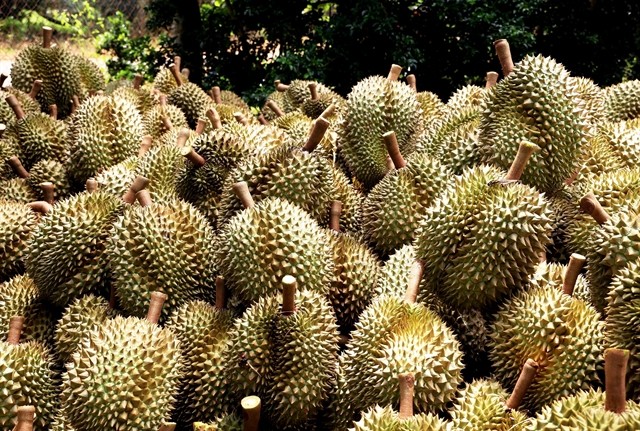
The European Union has announced the temporary increase of official controls and emergency measures governing the entry into the block of certain goods, including durian from Vietnam.
Accordingly, durian from Vietnam, both chilled and fresh, for the first time will be subject to identity and physical checks on 10 per cent of consignments.
In the announcement, the EU said that data from the Rapid Alert System for Food and Feed (RASFF) notifications and information regarding official control performed by the member states indicate the emergency of new risks to human health, due to a possible contamination by pesticide residues.
Therefore, it is necessary to require an increased level of official controls on durian from Vietnam.
Besides durian, peppers of genus capsicum (fresh, chilled or frozen) and instant noodles containing spices, seasonings or sauces from Vietnam are also included in the list for increased levels of official controls, with the frequency of identity and physical checks at 50 percent and 20 percent, respectively.
Okra (fresh, chilled or frozen) and dragon fruit (fresh or chilled) from Vietnam are subject to special conditions for entry into the union due to contamination risk by mycotoxins, with the frequency of 50 percent and 20 percent, respectively, meaning that quality certificates are required for entry.
This EU update adds more than 100 goods from 27 countries and will take effect 20 days from the announcement date, meaning the new regulations will be applied from early February.
EU imports around US$160 billion worth of agricultural products every year, of which, Vietnam accounted for a modest 4-5 percent.
Vietnam’s export revenue of agricultural products to the EU was $5.34 billion in 2023, a drop of 12.2 percent on falling consumption demand.
The durian export of Vietnam reached nearly US$2.2 billion in the first 11 months of 2023, 4.8 times higher than the same period last year. China was the largest market for Vietnam’s durian with a share of more than 91 percent. Exports of durian to some EU member countries increased strongly, such as Czech by 28,000 per cent and France by 32 percent.
The EU sets high technical standards for imported agricultural products.
Although the EU – Vietnam Free Trade Agreement has been implemented for 2 years, Vietnam’s ability to take advantage of the trade deal was estimated at only 12.1 percent.
Nguyen Thuy Linh from the Department of International Cooperation under the Ministry of Agriculture and Rural Development said that Vietnam must hasten efforts to take advantage of the trade deal as the EU is going to complete negotiations on an FTA with Thailand, a competitor to many Vietnamese products.
To expand in the EU, it was critical to reorganize agricultural production towards improved product quality, meeting sanitary and phytosanitary standards, together with promoting green and circular production, she said.
























